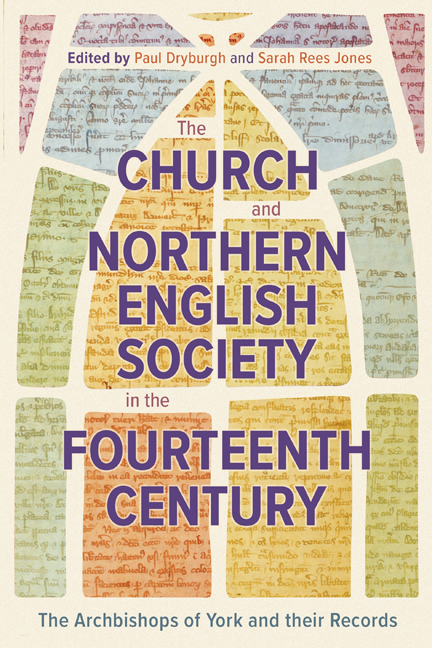 The Church and Northern English Society in the Fourteenth Century
The Church and Northern English Society in the Fourteenth Century Book contents
- Frontmatter
- Dedication
- Contents
- List of Illustrations
- List of Contributors
- Acknowledgements
- List of Abbreviations
- Map: The Ecclesiastical Province of York, c. 1304–1405
- Introduction
- 1 The Administrative Records of the Archbishops of York, 1304–1405
- 2 The Archbishops of York and the Government of Fourteenth-Century England
- 3 Support or Scourge? Archbishop William Melton and the Tradition of Loyal Opposition to the English
- 4 Beyond the Border: The Influence of York Clerks in the Two Edwards’ Scottish Administrations, 1332–1357
- 5 Responding to Royal Requirements: Clerical Taxation in the Province of York, 1304–1405
- 6 Ad insolenciam ipsius rebellis salubrius reprimendam: William Thorntoft, the Abbey of Rufford and Significations of Excommunication in the Northern Province
- 7 Blood, Sex and Holy Water: Reconciling Churches and Churchyards in the Medieval Diocese of York
- 8 Structuring Episcopal Authority: Palaces and Residences of the Archbishop of York
- 9 Medieval Parks of the Archbishops of York
- 10 Northern Ways? Pilgrimage, Politics and Piety in the Fourteenth-Century Administrative Records of the Archdiocese of York
- 11 Underexplored Sources for Gender History: New Approaches to the Fourteenth-Century York Archbishops’ Registers
- 12 Joan of Leeds and other Apostate Nuns in the Province of York, 1300–1350
- Bibliography of Records of the Archbishops of York, 1304–1405
- Index
1 - The Administrative Records of the Archbishops of York, 1304–1405
Published online by Cambridge University Press: 17 May 2024
- Frontmatter
- Dedication
- Contents
- List of Illustrations
- List of Contributors
- Acknowledgements
- List of Abbreviations
- Map: The Ecclesiastical Province of York, c. 1304–1405
- Introduction
- 1 The Administrative Records of the Archbishops of York, 1304–1405
- 2 The Archbishops of York and the Government of Fourteenth-Century England
- 3 Support or Scourge? Archbishop William Melton and the Tradition of Loyal Opposition to the English
- 4 Beyond the Border: The Influence of York Clerks in the Two Edwards’ Scottish Administrations, 1332–1357
- 5 Responding to Royal Requirements: Clerical Taxation in the Province of York, 1304–1405
- 6 Ad insolenciam ipsius rebellis salubrius reprimendam: William Thorntoft, the Abbey of Rufford and Significations of Excommunication in the Northern Province
- 7 Blood, Sex and Holy Water: Reconciling Churches and Churchyards in the Medieval Diocese of York
- 8 Structuring Episcopal Authority: Palaces and Residences of the Archbishop of York
- 9 Medieval Parks of the Archbishops of York
- 10 Northern Ways? Pilgrimage, Politics and Piety in the Fourteenth-Century Administrative Records of the Archdiocese of York
- 11 Underexplored Sources for Gender History: New Approaches to the Fourteenth-Century York Archbishops’ Registers
- 12 Joan of Leeds and other Apostate Nuns in the Province of York, 1300–1350
- Bibliography of Records of the Archbishops of York, 1304–1405
- Index
Summary
The registers of the fourteenth-century archbishops of York are among the best preserved episcopal registers in the United Kingdom, both in terms of their survival as a series and in terms of the range of their contents. David Smith's survey of both surviving and lost materials remains the fullest account of the range and location of the manuscripts. While the majority are now housed in the Borthwick Institute for Archives at the University of York, some strays are to be found in the British Library and some copies of lost materials are in York Minster Archives. Further small quantities of material relating to the archbishop's jurisdiction, especially ordinations, can be found in the diocesan archives at Carlisle and Durham.
By 1304, the archbishops of York were endowed with many powers and responsibilities in the spiritual administration of both the diocese of York and the Northern Province, and in the secular administration of their temporal estates. However, they did not usually exercise this authority in person. Their surviving registers provide a detailed record of the ways in which their powers were delegated to many other officials who exercised authority and provided spiritual services on their behalf. Indeed, the selection of records for registration became fundamental to the process through which archbishops delegated power and yet retained authority. Registered records provided evidence of entitlement to office, a framework for consistency of governance and enabled officials to be held accountable. These registered records were, however, far from the totality of records produced by members of the archbishop's administration; there were many other series of court records and papers to which they contributed, as will become clearer as this chapter progresses.3 Many administrative records that emanated from the archbishops’ household (familia) can be found as originals and copies in other archives, with the largest concentration being in TNA. Other archiepiscopal acta from the period survive in the cartularies and archives of other institutions with whom the archbishops corresponded and conducted business, such as other diocesan archives and those of religious houses and borough governments. It is on such survivals that the distinguished series of publications of episcopal acta for the twelfth and thirteenth centuries are based.
- Type
- Chapter
- Information
- The Church and Northern English Society in the Fourteenth CenturyThe Archbishops of York and their Records, pp. 12 - 79Publisher: Boydell & BrewerPrint publication year: 2024


